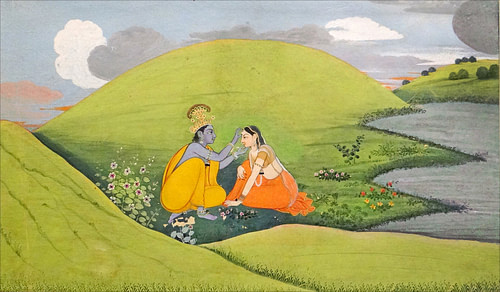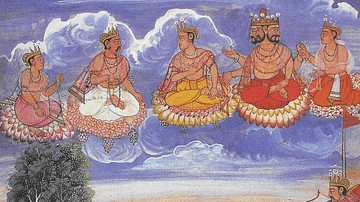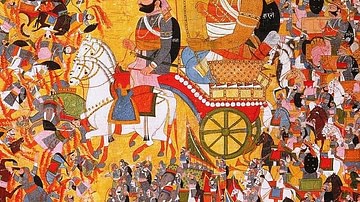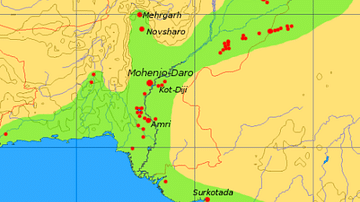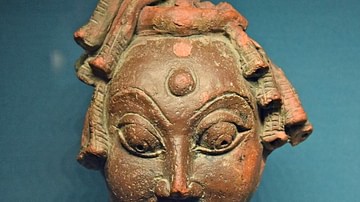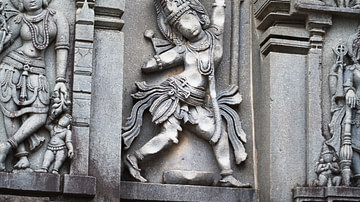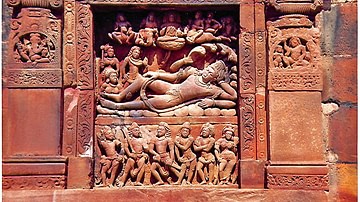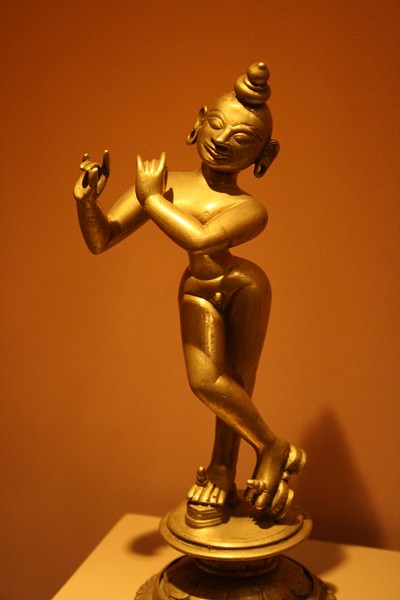
Krishna (Krsna or Hari Krishna) is a major god of the Hindu pantheon and considered the eighth incarnation of Vishnu. He is perhaps the most popular of all the heroes of Hindu mythology. Krishna's adventures appear in the Mahabharata, Bhagavad Gita, Harivamsa, and the sacred texts known as the Puranas where he is described as the Supreme Being and creator of the universe.
The most ancient tales of Krishna in sacred texts involve his adventures with the Pandava princes whilst later, stories accumulated over the centuries which describe his eventful youth, when Krishna used his proficient weapons skills to good effect to defeat a host of fearsome enemies, demons and monsters.
Family & Adventurous Youth
According to tradition Krishna belonged to the Yadava - a pastoral race - and the god's birth is picturesquely described in the Mahabharata. One day Vishnu, the great Hindu god pulled two hairs from his own head, one white and one black. The black hair was planted into the womb of Devaki, a princess of the city of Mathura, and so Krishna was born into the Pandava family, his earthly father being Vasudeva. Unfortunately for Krishna his mother's brother, Kamsa, had been warned that Devaki's eighth child would kill him, and so Kamsa determined to murder the eighth child, a crime he had already carried out seven times before Krishna was born. Fortunately, Vasudeva took the precaution of hiding Krishna in the remote village of Vrindavana where the boy was brought up as a simple cowherd (in this guise he can be referred to as Govinda). There he spent an idyllic childhood and stirred the hearts of many gopis or herd-women with his dark good looks, playful charm, and mastery of music and dance.
Thus the story of Krishna contains a double concealment - Krishna is both a god disguised as a mortal and a prince disguised as a commoner. Accordingly, the myths contain many metaphors of disguise, such as a spark within a pile of ashes or a mighty sword in its scabbard, and these hint at Krishna's dual purpose as the punisher of human deeds but also as a bringer of enlightenment.
Krishna's foster parents at Vrindavana were Nanda and Yashoda, his sister is Subhadra, and his brother Balarama. Krishna's favourite consort was the cowherd woman Radha (or perhaps even his wife if they married in secret, as some sources claim). Tradition has it that the god actually acquired 16,108 wives and fathered 180,000 sons. Queen Rukmini, an earthly form of the goddess Lakshmi, is considered Krishna's second most favoured wife after Radha. With Rukmini, Krishna had a son, Pradyumna, and a daughter, Carumati.
Krishna was involved in many escapades in his adventurous youth. Notable amongst these are his various killings and thrashings of prominent enemies such as the ogress Putana, the giant bull danava, the giant snake Kaliya, and the king of the Hayas (horses). Also swiftly dealt with was the scheming tyrant Kamsa – after whose beheading Krishna established himself as king of Mathura. Krishna slew many demons and demon kings: Muru and his 7,000 sons, Pralamba – who Krishna beat up using only his fists, Naraka – son of the Earth and who had accumulated a harem of 16,000 captured women, and the sea-demon Pancajana who looked like a conch shell and who lost his magic shell to Krishna which the hero carried thereafter and used as a trumpet. Krishna also found time to lift the mountain Govardhana to foil a terrible deluge sent by Indra, to conquer Saubha, the floating city of the Titans (daityas), got the better of the sea-god Varuna, and even managed to steal the divine discus possessed by the fire-god Agni. Against mere mortals Krishna also wreaked havoc amongst the Gandharas, Bhojas, and Kalingas, amongst others.
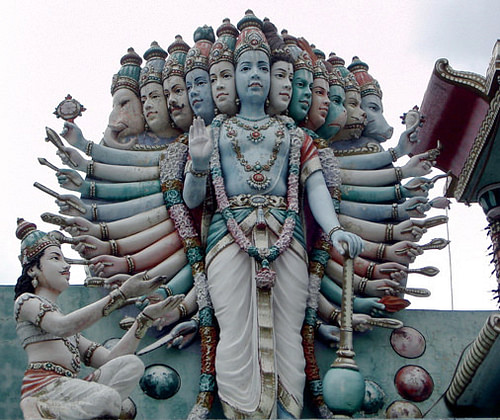
Krishna & Arjuna
Krishna acted as the warrior-prince Arjuna's charioteer in the Great War, the Battle of Kurukshetra, between the Pandavas (whom Krishna supported) and the Kauravas. It was on the eve of this battle that Krishna recounted the sacred song of the Bhagavad Gita to Arjuna. Within, Lord Krishna highlights that the self is quite separate from the body and continues throughout time: 'Never was there a time I did not exist, nor you, nor all these kings; nor in the future, shall any of us cease to exist' (Bhagavad Gita). It is in the Bhagavad Gita that Krishna also states that 'All this universe has been created by me; all things exist in me'. Arjuna, in the same work, tells us that Krishna is 'divine, prior to the gods, unborn, omnipresent'.
In other adventures Krishna built the great fortress city of Dvaraka in Gujarat, known as the 'City of Gates'. Seven days after Krishna was accidentally killed by a hunter's arrow striking his heel, Dvaraka was submerged beneath the ocean. Krishna had also stolen the sacred Parijata tree from Indra, defeating the god in the process. Krishna planted the tree at Dvaraka, but upon his death it was returned to Indra.
Worship & Representation in Art
The worship of Krishna may have started as early as the 5th century BCE. Today he is worshipped as the supreme Hindu god by many believers, and he is especially revered in Bengal and Udupi in southern India. One of the many festivals held in his honour is the ratha-yatra chariot festival in Puri which commemorates Radha's successful attempt to persuade Krishna to return to Vrindavana.
Perhaps the most widely observed festival is the Krishna Janmashtami (mid-August to early September) which involves devotees fasting for 24 hours, offering milk sweets to the baby Krishna, and, at midnight, lighting wicks soaked in ghee (purified butter) in the ritual known as arati.
Krishna is typically portrayed in Hindu art with a dark skin (usually blue-black), and he may carry the cakra discus Vajranabha and the club Kaumodaki – both given to him by Agni. He typically wears a yellow robe, has a peacock feather in his long black hair, and commonly plays a flute. In reference to his occupation as a cowherd in his youth, Krishna is often accompanied with cows. In Khmer art the most popular scene of Krishna's adventures is the lifting of Mt. Govardhana, and the god is frequently represented in the architectural sculpture at such famous sites as Angkor Wat.
